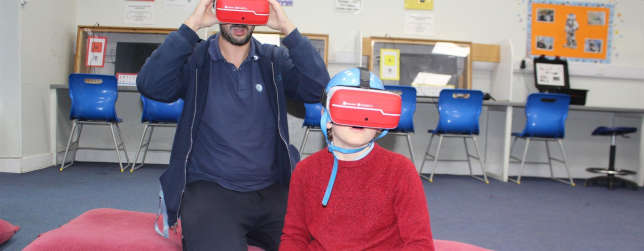School Uses VR to Introduce Students to New Situations
- By Dian Schaffhauser
- 02/11/20
A British school that works with people who have severe autism is turning to virtual reality to help its students try out new experiences. Prior's Court School in England recently purchased four VR headsets made by Inclusive TLC.
According to school officials, the gear will help in three ways:
-
First, by experiencing events virtually, students can become accustomed to scenarios they're likely to encounter outside of school that they could find stressful or anxiety-inducing, such as riding a bus or going to the airport;
-
Second, by providing relaxation to students via sensory experiences; and
-
Third, to give the students experiences they might not ever have otherwise, such as skiing.
The school has also purchased a 360-degree camera to allow staff members to capture environments inside and outside of the school grounds, providing students with a wider range of scenarios.

"A key part of our computing curriculum is about working with other departments across Prior's Court to use technology to facilitate our young people's wider learning and developing their independence," said Computing Teacher Nuno Guerreiro, in an article about the project. "VR headsets provide a valuable contribution to this approach--from preparing our young people for 'everyday' scenarios they may encounter outside of school and familiarization with locations they may visit on work placements to using the sensory experiences to complement the work of our occupational therapists."
The school has gained a reputation for its use of innovative technology. In the past, it has adopted the use of robots to improve students' social and communication skills. And last year Prior began raising funding for Prior Insight, a digital platform that lets staff and teachers record data about students on the fly and get analysis to better understand how certain factors affect them. For example, according to the school, the program identified that one student's behavioral incidents "spiked" before he had an "absence seizure," an event that lasts just seconds and may come across as daydreaming or staring off into space. "Now staff are alerted when his behaviors spiked so they can be extra vigilant for seizure activity," the school noted in a video about that program.
About the Author
Dian Schaffhauser is a former senior contributing editor for 1105 Media's education publications THE Journal, Campus Technology and Spaces4Learning.